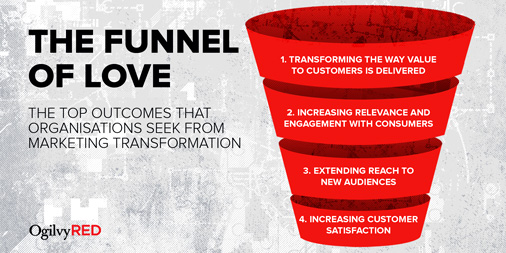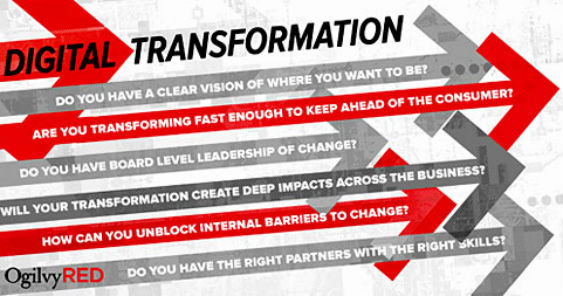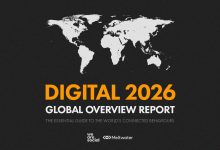ASIA PACIFIC – The time for leveraging technology to transform marketing has come. With Consumer Digital Adoption moving at a rapid pace, marketers are charged, now more than ever, to find more effective engagement strategies to respond to the always-on consumer, specifically through digital transformation.
What exactly does “digital transformation” mean and how do organizations overcome the roadblocks? The ultimate challenge is how to grow brand and business value through great customer experiences. Marketers need to make their brands matter in every channel and every touchpoint, delivering content through more relevant digital experiences.
OgilvyRED’s Digital Transformation Survey explores the transformation journey of different industry sectors across Asia Pacific, and how prepared – or unprepared – businesses are in tackling those challenges and changing trends. The Survey analysed a cross-section of senior marketing executives, of VP and CMO positions, on their view of ‘Marketing 3.0’ and the challenges they face on their journey.
Lucy McCabe, President, OgilvyRED Asia Pacific, said, “Digital adoption has passed the tipping point. The time has come for digital to make an impact and revolutionize organizations and the ways in which they connect with their consumers. Yet, results show that the journey to true Digital Transformation is, in fact, a road less far travelled than we might think.”
Over 90% of the organizations surveyed described themselves as ‘somewhere on the journey’ to transformation, with only 17% of those surveyed currently delivering a new digital experience, leaving over 80% of companies with no plan or behind the digital curve.
“Challenges vary between sectors and markets, but the key is to identify the roadblocks and bridge those gaps. Companies need to challenge traditional success metrics and deliver consumer experiences based on intimate algorithms that shape the experience around that consumer,” adds Lucy.
What does Digital Transformation mean today?
The current challenge in marketing transformation is no longer purely about technology. Organizations need to embrace and leverage technology to create fresh business models and adopt new digital channels to meet the needs of its consumers.
The increasing infusion of digital into marketing has already started to change certain industry sectors – some accelerating faster than others. Industry sectors such as IT, Telecoms and Travel & Tourism lead the way in digital transformation, according to the Survey, and even the FMCG sector is focusing more on marketing transformation as a way to build direct relationships with consumers at every stage of the marketing funnel.
86% of respondents had seen significant increases in digital marketing budgets over the last three years, and 55% also pointed to growing e-commerce as a priority, speaking to a broad buy-in and investment in digital transformation across the industry.

The Funnel of Love
The top four outcomes organizations seek from Marketing Transformation are customer-focused, which indicates that marketers are finding it increasingly challenging to drive efficiencies at the top of the funnel, both in traditional and digital channels. These are:
- Extending reach to new audiences
- Increasing relevance & engagement with consumers
- Transforming the way value to customers is delivered
- Increasing customer satisfaction
Perceptions on the Challenges of Digital Marketing Transformation
Respondents identified leadership as the key driver of success in an organization’s transformation process, whether that’s brought in internally or through an external agent to drive the process. But, the majority of marketers identified internal change management as the most significant barrier to success. Organizations need to integrate and departments need to work closely together to effectively deliver transformed customer experiences.
Additionally, many of the surveyed emphasized their struggle to find an integrated agency that demonstrates a depth of specialist expertise. Partnerships are becoming increasingly important in order to bridge these gaps.
Jerry Smith, Chairman, OgilvyRED Asia Pacific, said, “We are competing in a data-driven digital world. Brands need to unblock internal barriers and seek a trusted partner with deep expertise to deliver tailored content and consumer experiences as individually relevant as possible. More organizations see this as a high priority on their Marketing Transformation agenda, but need to move faster on their path to transformation.”
Survey Methodology
The Ogilvy Digital Transformation Survey 2016 was an online market study conducted between September and November 2016. The survey garnered 82 respondents. These contacts hold Senior Marketing positions within organizations, typically VP, CMO or above, holding either Global, Regional or local marketing responsibilities. All the target organizations have more than 500 employees. Selected follow up face to face and telephone interviews were conducted with a selection of respondents.







